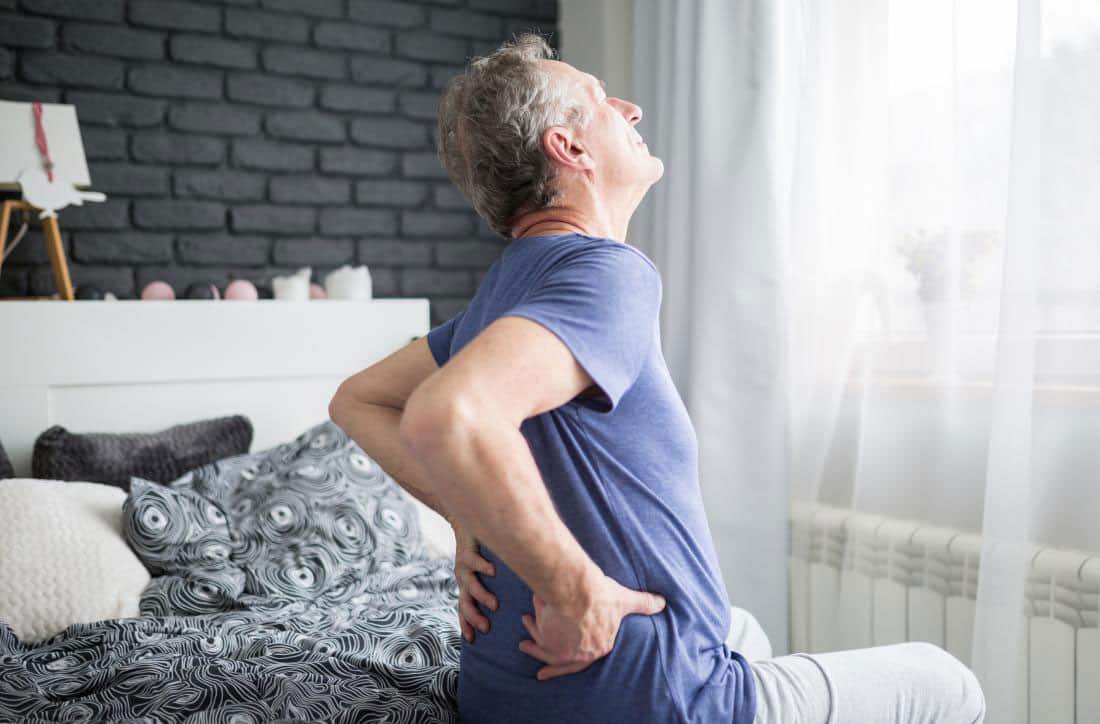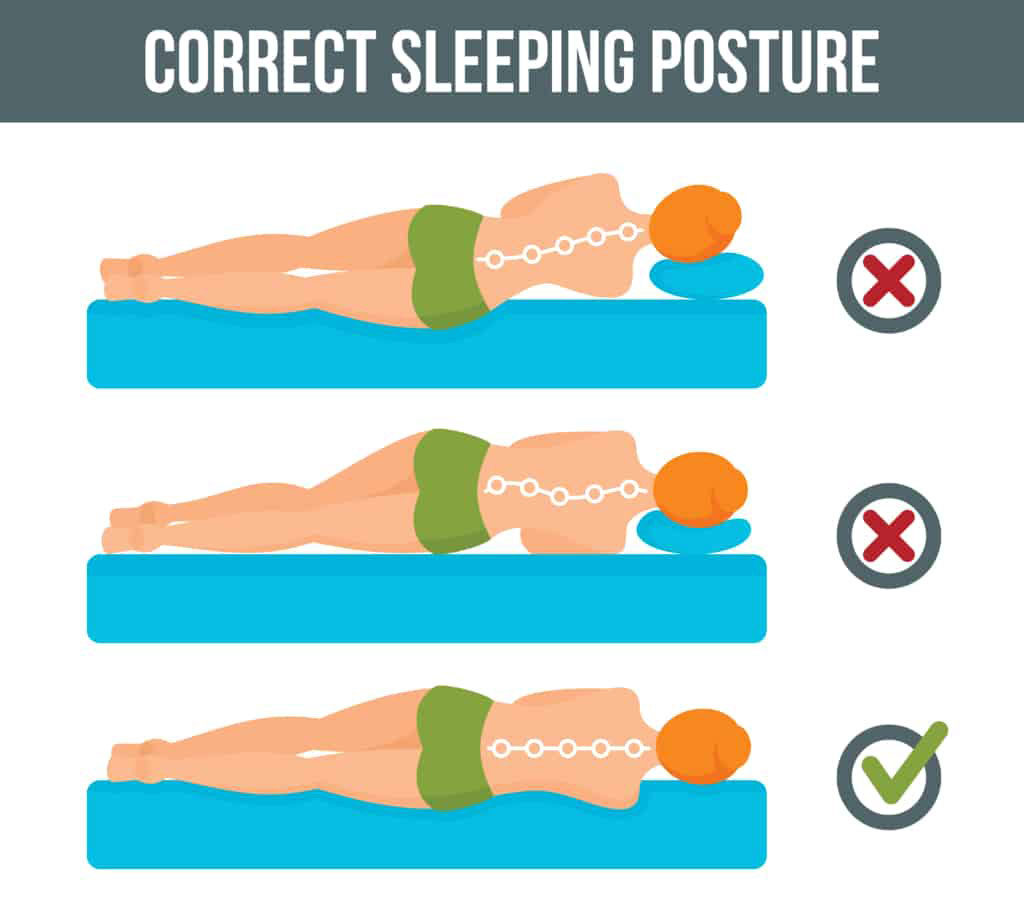DOES YOUR BACK HURT IN THE MORNING?
You should wake up in the morning feeling refreshed and energized after a long night’s sleep. Sometimes, you may wake up from chronic pain in the morning that makes your day difficult. When you have a big day ahead of your morning back pain can be very frustrating. It’s important to address this issue so you can climb out of bed to be ready for a good start.
Morning back pain usually results from stiffness from long periods of rest or decreased blood flow from sleeping. The pain usually subsides after moving around. Morning back pain is usually periodic, but some people experience it more often than others. Persistent morning back pain can be caused by many issues, including:
- Stress
- Poor posture
- Underlying medical conditions
Morning back pain is common and around 16 million adults in the U.S. deal with regular or constant back pain.

REASONS BEHIND MORNING BACK PAIN
Usually, morning back pain is only the result of sleep itself. Once you start your daily activity, the synovial fluid (that lubricates the joints) circulates and keeps things moving smoothly. The movement will increase the blood flow that will give oxygen and nutrients to your joints, muscles, and connective tissues.
Some of the common reasons for morning back pain include:
- Sleeping Position: Your poor sleeping positions can put pressure on your spine resulting in the natural curve flattening. Your poor sleeping position can also cause back strain and uncomfortable pressure on your joints. Back pain is more common if you frequently sleep on your stomach. The doctors recommend changing your sleeping position such as sleeping on your side or your back with a pillow beneath your knees. You can place a pillow under your pelvis or lower abdomen for support if sleeping on your stomach is the only comfortable position. This will take the pressure off of your back.
- Bad Mattress: Replacing the old mattresses with a new one can greatly improve your sleep. Switching out mattresses older than nine years for newer ones can improve sleep quality, reduce back discomfort, and reduce stress symptoms.
- Pregnancy: Morning back pain is common among pregnant women as early as 8 weeks into the pregnancy. But, mostly it is the problem between the fifth and seventh months. Pregnancy might put a strain on lower back muscles after sleeping for a long period. The lower back pain during pregnancy can worsen in the morning, causing prolonged stiffness and muscle tightness. Stretching when you wake up along with a warm compress will reduce pain and discomfort. You should use your legs to stand up rather than put pressure on your back.
- Disc Regeneration: This is a natural result of aging and wear and tear on your body. This condition occurs when spinal discs between your vertebrae begin to deteriorate that can cause intense pain and discomfort. The condition may worsen in the morning causing pain and discomfort. The pressure inside the disc is higher in the morning.
- Fibromyalgia: This leads to widespread musculoskeletal pain. Fibromyalgia may amplify pain by affecting how your brain processes pain signals. Women, in general, are more susceptible to fibromyalgia.
- Spinal Stenosis: The back pain in the morning is from compression of the nerves resulting from the narrowing of the spaces around the spine. This condition is affected by the way you sleep, causing more pressure to be placed on the nerves during the night. The pain and numbness can radiate from the back into other areas of the body such as the arms, legs, and neck.

Apart from the above condition morning back pain can also be caused due to other medical conditions that include:
- Osteoarthritis
- Rheumatoid arthritis
- Ankylosing spondylitis
- Lupus
- Herniated disc
- Sciatica
Morning back pain can also result due to a vitamin or mineral deficiency (such as vitamin D or calcium), chronic overuse, stress, poor posture, or a current illness.

IDENTIFYING MORNING BACK PAIN
Some of the other symptoms associated with this condition include:
- Fatigue
- Restless sleep
- Memory issues
- Altered moods
- Tension headaches
- Irritable bowel syndrome
- Anxiety
- Depression
- Leg muscle weakness or foot drop.
- Numbness and tingling in the arms and legs.
- Pain worsens with sitting, lifting, or bending.
- The pain improves with walking, moving, or changing position.

TREATMENT OF MORNING BACK PAIN
A lot of things at home can improve your morning back pain, which includes:
- A new mattress: The type of mattress helps to relieve back pain and improve spinal alignment. The most effective mattresses are medium-firm and custom inflated.
- A new pillow: The pillow supports your neck well and keeps it in a straight line with the rest of your spine.
- A change in sleeping position: The sleeping position should have your ears, shoulders, and hips to be in alignment with each other. The best sleeping position is on your back but if you have to sleep on your stomach you can put a pillow under your pelvis or lower abdomen to help keep your spine properly aligned. You can try some of the tips such as:
Placing a pillow underneath your knees if you sleep on your back. This can align the spine better and reduce lower back pain when you wake up.
Place a pillow between the legs in case you are a side sleeper. This helps to better align the hips and spine.
Place a pillow underneath the lower abdomen if you are a stomach sleeper. This can reduce the curvature in the lower back. - Over-the-counter pain medication: Some of the OTC medications such as acetaminophen, ibuprofen, naproxen, or salicylic acid relieve morning back pain.
- Increasing your exercise: Healthier joints are less prone to getting stiff and sore while you sleep. Exercising will help reduce the pain and increase the flexibility of the back. Walking throughout the day is the best exercise to alleviate back pain.
- Morning stretches: The back stretches in the morning before you get out of your bed are a great way to loosen up your stiff joints and get rid of the morning back pain.
- Topical Remedies: Massage with essential oils such as turmeric and peppermint helps in alleviating the pain as well as loosening the stiff joints. It is important to dilute these in carrier oils, such as those made from jojoba or olive, or else they can irritate your skin.
You should consult a doctor if an underlying medical condition, including fibromyalgia, herniated disc, sciatica, or lupus, causes periodic bouts of morning back pain. This usually clears up in between, so also report any back pain that comes and goes—especially if you experience fatigue, rashes, or cognitive dysfunction (“brain fog”) at the same time.
OUTLOOK
Morning back pain is common among people of the U.S. The morning back pain symptoms usually improve within minutes of moving and stretching. But, if you begin to experience discomfort every morning, your pain may be an indication of a bad mattress or an underlying medical condition.
You can easily eliminate your morning pain with the proper diagnosis and treatment, and a focus on living a healthy lifestyle. You can contact our experts if you are suffering from contact back pain after a night of proper sleep.
People Also Read:
If you or anyone you know is suffering from back pain, our expert providers at Specialty Care Clinics will take care of your health and help you recover.
Call us on (469) 545-9983 to book an appointment with our specialists.
